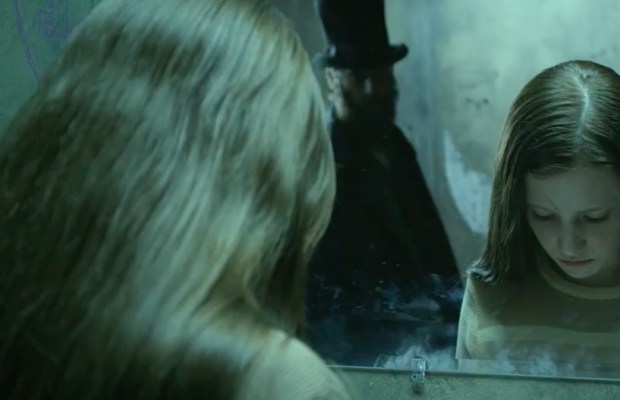As part of Dead By Dawn Festival
The sins of the past may be weighted down and cast into the depths but time has a habit of bringing them bubbling to the surface. Hunter Adam’s moody morsel of American Gothic is a streamlined thriller of three families pulled together by the centripetal force of events thirty years prior.
Events are split between 1947 and 1977, with a local query proving the catalyst to events in both timelines. In 1947, two bodies are hurled from the cliff overlooking the quarry by two policemen, Deputy Waterhouse (Ted Levine) and Sheriff Proctor (Danny Goldring), an action that provokes external enmity between the men. In 1977 Waterhouse’s granddaughter Jacqueline “Jake” Mather (Samantha Isler) sees her brother Sean perish after jumping from the cliff in a case of death by misadventure; misguided youthful exuberance designed to help her get over her fear of the water. She’s approached by sinister gypsy Wyeth Buchta (Troy Ruptash) with a Faustian offer. He can bring her brother back, but there must be a sacrifice, and it relates to the actions of the two policemen in 1947.
Dig Two Graves is dense and swampy with gothic atmosphere and Old Testament retribution. It’s a sparse, pared-back mystery that could have come from the pen of William Faulkner, or told in a song by Nick Cave in his most morbid murder ballad period. There is not a frame of excess baggage; every moment ripe and fecund with promised revelation. At its core are two great performances by Ted Levine and Samantha Isler. Waterhouse, now the Sheriff is a man bowed, but not broken by his guilt, his weathered features suggesting a life he’s subsequently devoted to his community in a search for redemption. Isler embodies a girl dealing in the absolutes of adolescence, prepared to contemplate the unthinkable and perhaps walk the same dark road as her grandfather.
If there’s a flaw in Dig Two Graves, it’s that the story’s ends are tied up a little too neatly, in a way that doesn’t quite suit the rugged and ambiguous atmosphere of its presentation. Everything is resolved, everything explained, and while one can appreciate the deft mechanics of the plot like an antique clock, a few questions left unanswered would have felt in keeping with the morally soupy events. Also, the gypsies are presented as uniformly sinister, particularly Wyeth’s two brothers that appear to have walked straight out of John Boorman’s Deliverance. And was the topless dancer with the snake really necessary? It felt like a small blotch of exploitation on an otherwise pristine canvas.
Really, the small flaws are only that more noticeable as Dig Two Graves gets so much right. It’s an immaculately presented, bracing shot of country noir, with the landscape as important a character as any of the human protagonists. A festival highlight.
